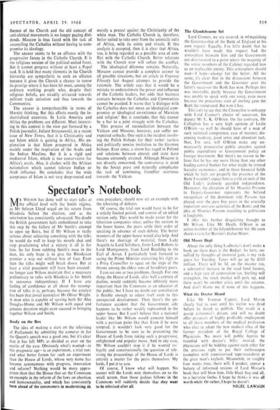The Glyndebourne Set Lord Cromer, we are assured, is relinquishing
the Governorship of the Bank of England at his own request. Equally, I've little doubt that he wouldn't have made this request had the atmosphere between him and the Government not deteriorated to a point where the majority of the senior members of the Cabinet regarded him as an implacable enemy. This atmosphere should now—I hope—change for the better. All the same, it's clear that in the discussions between the Government and the Governor over the latter's successor the Bank has won. Perhaps this was inevitable, partly because the Government was unable to speak with one voice, even more because the precarious state of sterling gave the Bank the trump card. But won it has.
This isn't to say that the Chancellor is unhappy with Lord Cromer's choice of successor, his deputy Mr L. K. O'Brien. On the contrary, Mr Callaghan has a very high opinion of Leslie O'Brien—as well he should have of a man of such technical competence, ease of manner, dis- arming modesty, good sense and abundant tact. Nor, I'm sure, will O'Brien make any un- necessarily provocative public speeches against public expenditure or Government policy on foreign investment. But there's no reason to be- lieve that he has any more liking than any other leading central banker for what might be termed Socialist economics; and in those financial fields which he feels are properly the province of the Bank I wouldn't expect him to yield an inch of the Old Lady's jealously guarded independence. Moreover, the elevation of Sir Maurice Parsons to Deputy-Governor represents the belated recognition of the dominant role Parsons has played over the past five years in the crucially important overseas activities of the Bank; and the idea of Maurice Parsons truckling to politicians is laughable.
I offer this further disquieting thought to Mr Wilson. Like Mr Heath, O'Brien is an active member of the Glyndebourne Set. He even shares a taste for Rossini's Stabal Mater.










































 Previous page
Previous page